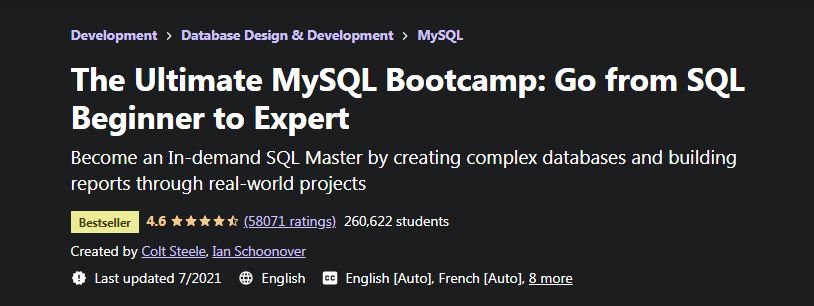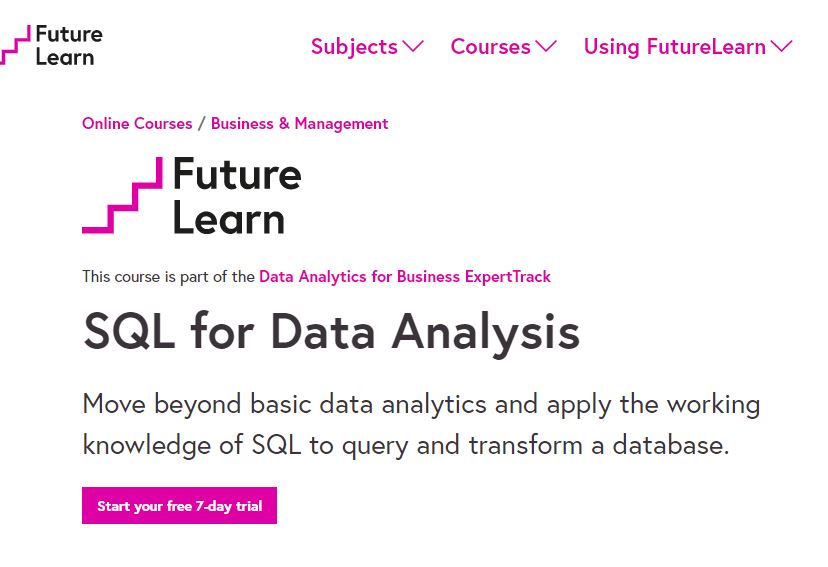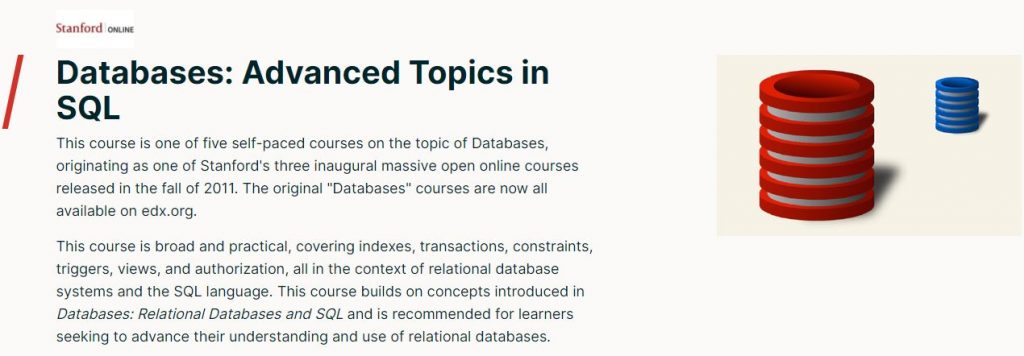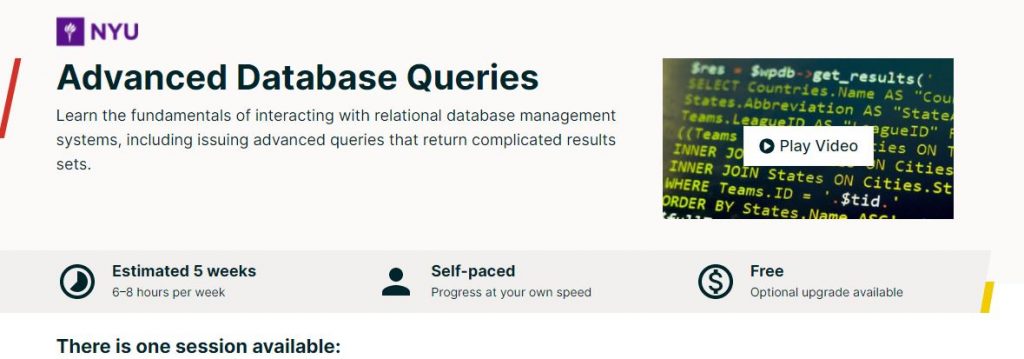Structured Query Language or you can simply say SQL is a standardized language that is accepted worldwide working with relational databases. SQL is mostly used to enter, search, modify, and then delete the different database entries. It is believed that the more time you tend to spend as a practitioner, the more effectively you will be able to utilize the platform in getting answers that your business needs from the sea of data available now-a-days.
Structured Query Language was initially developed by the IBM’s two employees named Donald D. Chamberlin and Raymond F. Boyce. These two were inspired by IBM computer scientist Edgar Codd’s internal research paper regarding organizing data sets within databases efficiently.
- Advantages of Learning SQL
- How Long Does It Take To Learn Basic SQL?
- How Long Does It Take To Learn Intermediate SQL?
- How Long Does It Take To Learn Advanced SQL?
Advantages of Learning SQL
Learning to use SQL comes with a variety of advantages some of them are mentioned below.
SQL is very easy to Pick up
Yes it is true that SQL’s basic commands are very easy to retain and utilize as they are very similar to the English language. INSERT, DELETE, and UPDATE are some of the examples of SQL commands which are similar to English. And thus makes it very easy to pick up.
Can easily Manage vast Pools of Data
For decade, we were using spreadsheets as a go-to method to store and analyze data sets. But sadly they were restrictive when it came to handling large data. And this problem was solved by SQL because it has the capacity to handle enormous pools of data much more efficiently.
It helps to find the right Information Fast
A person who is well-versed in SQL can pull up relevant information from enormous data sets in just seconds. The simple reason behind this is that SQL stores data in a much more organized manner than most of the available alternatives and that is why you can easily tweak the queries within the program.
SQL helps to mine your Data Efficiently
It is because SQL that you are able to update your relational database with quite ease. This feature here sets SQL apart from other available options in the markets. You can easily monitor and update data in tables and in the database and also filter data as per relevant time intervals.
How Long Does It Take To Learn Basic SQL?
Are you interested in learning basic SQL but don’t know how long will it take you to do that? Well, normally it should take about two to three weeks for a person to understand the basic concepts of SQL. But all depends upon the speed of the learner. Here we have mentioned some of the courses that can be of great help in learning basic SQL.
SQL for Beginners: The Easiest Way to Learn SQL Step by Step
-
-
- Code Star Academy via Udemy
- 9,236+ already enrolled!
- ★★★★★ (1,516 Ratings)
-
| Online Course Effectiveness Score | |||
| Content | Engagement | Practice | Career Benefit |
| Good ★★★★☆ |
Good ★★★★☆ |
Fair ★★★☆☆ |
Fair ★★★☆☆ |
In this course, you will learn SQL by coding. Here the instructor aims to teach you to write, read, and analyze SQL queries in detail. Then you will get a chance to learn to create solution on any SQL problems. The instructor will also talk about the database terminology in detail. After that, you will learn to download and install the related software in a step-by-step guide. Then you will learn to get any data from the database and learn to use different SQL functions. Other topics like how to group data, combine results, using queries inside of queries, and more will be discussed in detail.
Introduction to SQL
-
-
- DavidsonX via edX
- 4 weeks (3-5 hours weekly) of effort required
- Course type: Self Paced
- Course Level: Introductory
-
In this course, you will get to understand and utilize SQL to aggregate, manipulate, analyze, and then visualize data in your field. The instructor will explain how you can use a relational database in detail. Then you will understand how to query data and shape results. Similarly, the instructor will explain how you can write advanced queries and analytic functions. After that, you will learn to create and modify data in tables and much more in this course.
Introduction to Databases and SQL
-
-
- National Centre for Computing Education via Futurelearn
- 3 weeks (2 hours weekly) of effort required
- 14,999+ already enrolled!
- ★★★★★ (137 Ratings)
-
| Online Course Effectiveness Score | |||
| Content | Engagement | Practice | Career Benefit |
| Excellent ★★★★★ |
Excellent ★★★★★ |
Good ★★★★☆ |
Fair ★★★☆☆ |
In this course, you will get a chance to discover how databases work and how you can use SQL in the most effective possible manner. The instructor will explain what databases are and why we tend to use them. With that, you will explore how to use SQL to search and manipulate data. Similarly, you will learn about primary keys and table relationships in detail. After that, the instructor will explain how to create joins to search multiple tables. Finally you will learn to group and look at exporting data from database. You might also be interested in SQL for data science free online courses.
The Ultimate MySQL Bootcamp: Go from SQL Beginner to Expert
-
-
- Colt Steele via Udemy
- 260,622+ already enrolled!
- ★★★★★ (58,071 Ratings)
-
| Online Course Effectiveness Score | |||
| Content | Engagement | Practice | Career Benefit |
| Excellent ★★★★★ |
Good ★★★★☆ |
Fair ★★★☆☆ |
Fair ★★★☆☆ |
Do you want to become an in-demand SQL master by creating complex databases and building reports? In this course, you will learn to do that through real-world projects. The instructor will explain how you can create your own database or interact with existing databases in detail. You will learn to write complex SQL queries across multiple tables. After that, you will learn to build a web app using NodeJS and MySQL. Then you will learn to model real-world data and generate reports using SQL.
SQL for Data Science
-
-
- UC Davis via Coursera
- 14 hours of effort required
- 334,746+ already enrolled!
- ★★★★★ (10,280 Ratings)
-
| Online Course Effectiveness Score | |||
| Content | Engagement | Practice | Career Benefit |
| Excellent ★★★★★ |
Excellent ★★★★★ |
Fair ★★★☆☆ |
Fair ★★★☆☆ |
In this course, you will be taught how to identify a subset of data that is needed from a column or set of columns and then write a SQL query to limit to those results. The instructor will explain how to use SQL commands to filter, sort, and summarize data. You will be taught how to create an analysis table from multiple queries using UNION operator. With that, you will learn to manipulate strings, dates, and numeric data using functions and much more.
How Long Does It Take To Learn Intermediate SQL?
When you have learned the basic SQL, the next step is to learn the intermediate SQL. Now there is no set time that one should take to learn intermediate SQL because it only depends on the speed of the learner. But still it shouldn’t take more than a month to understand the intermediate level concepts. Below are some courses that we recommend you to take in order the learn intermediate SQL.
SQL for Data Science
-
-
- IBM via edX
- 4 weeks (2-4 hours weekly) of effort required
- 72,793+ already enrolled!
- Course Level: Introductory
-
In this course, you will learn to use and apply the very powerful language of SQL that can help you better communicate and extract data from databases. In this course, you will learn and apply the foundational knowledge of the SQL language in the most effective possible manner. Similarly, you will learn to create a database in the cloud in a step-by-step guide. After that, you will learn to use string patterns and ranges to query data. Thus this and much more will be learned in this course. If you’re interested in Python Specialization courses then click here.
SQL for Data Analysis
-
-
- Coventry University via Futurelearn
- 4 weeks (4 hours weekly) of effort required
- Course type: Self Paced
-
Do you want to move beyond the basic data analytics and apply the working knowledge of SQL to query and transform a database? In this course, you will learn to do that in detail. The instructor will help you understand the difference between correlation and causation. After that, you will understand the potential pitfalls in making assumptions in this area. Going further, you will understand the more advanced SQL skills. Then the instructor will talk about the diagnostic analytics and relationships in data. You can also find out 27 Practical SQL Queries.
Data Science Fundamentals with Python and SQL Specialization
-
-
- IBM via Coursera
- 6 months of effort required
- 8,210+ already enrolled!
- ★★★★★ (825 Ratings)
-
| Online Course Effectiveness Score | |||
| Content | Engagement | Practice | Career Benefit |
| Excellent ★★★★★ |
Excellent ★★★★★ |
Fair ★★★☆☆ |
Fair ★★★☆☆ |
In this specialization, you will get to build the foundation for your data science career. Here you will develop hands-on experience with Jupyter, Python, and SQL and perform statistical analysis on real data sets. Similarly, you will gain knowledge of data science tools like R studio, GitHub, and Watson studio. After that, you will understand the python programming basics and more in detail.
How Long Does It Take To Learn Advanced SQL?
Done with learning the intermediate SQL? Let’s move on towards learning advanced SQL. Below are the courses that we suggest to learn advanced SQL.
Advanced Topics in SQL
-
-
- StanfordOnline via edX
- 2 weeks (8-10 hours weekly) of effort required
- 11,075+ already enrolled!
- Course Type: Self Paced
-
In this course, you will get an introduction to the relational model and concepts in relational databases and relational database management systems. The instructor will explain how you can create indexes for increased query performance. Then you will learn to use transactions for concurrency control and failure recovery. Similarly, you will get a chance to understand database constraints which include referential integrity and check constraints and more. After that, there will be detailed discussion on what database triggers are. In addition, you will understand how views are created, used, and updated in relational databases. You can also checkout online courses with certificates by click here.
Advanced Database Queries
-
-
- NYU via edX
- 5 weeks (6-8 hours weekly) of effort required
- Course Type: Self Paced
- Course Level: Intermediate
-
In this course, you will learn the fundamentals of interacting with relational database management systems in detail. The instructor will talk about the advanced queries that return complicated results sets. You will learn to develop queries in SQL to aggregate data stored in database. Then you will learn to choose the proper datatype for storing a piece of information in a database. After that, you will learn to design a database that is very effective for storing data and provides correct results in queries. Thus this and much more about advanced database will be learned in this course.
Programming Courses
100+ Courses
★★★★★
Cybersecurity courses
30+ Courses
★★★★★
Business Courses
70+ Courses
★★★★☆
Blockchain Courses
20+ Courses
★★★★★
Data Science Courses
150+ Courses
★★★★★
Mobile App Development Courses
50+ Courses
★★★★★
Final Thoughts
As you can see, there are different courses available for mastering the basic, intermediate, and advanced SQL. With each learner, the duration would be different. But the above courses are the most effective and easy way for any learner to learn SQL. So, take a look at the courses that can help you master the basic, intermediate, and advanced level SQL and never stop learning.


















